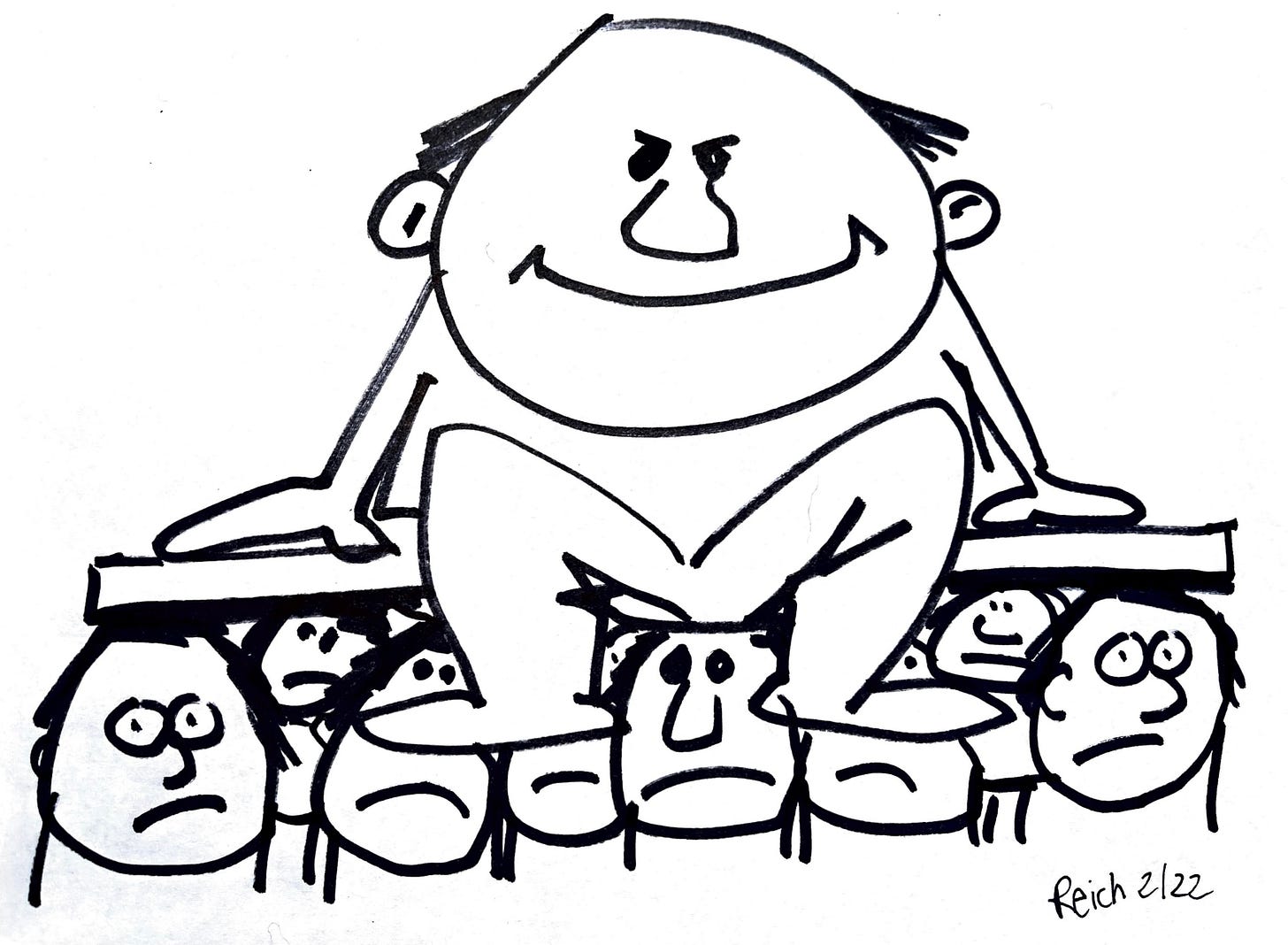Friends,
Last week, two things happened that may shed some light on where American capitalism is heading.
First, Tesla’s board caved in to Elon Musk’s demand that he get a pay package of $1 trillion (if he meets various goals).
Musk’s trillion-dollar pay package is so grotesque as to make a mockery of the most ardent free-market capitalists. Although his board is stuffed with cronies and relatives, he still had to hold it hostage to get his trillion — threatening that if he didn’t, his attention would wander elsewhere. Other Tesla shareholders got shafted.
Second, the voters of New York City — the capital of world capitalism — elected as their mayor a Democratic Socialist who thinks billionaires shouldn’t exist.
New York’s oligarchs spent more than $55 million trying to defeat Mamdani and get Andrew Cuomo elected instead. With Cuomo winning just under 855,000 votes, that came to about $65 per vote. Total spending for Mamdani was about $16 million. With Mamdani winning more than 1 million votes, that came to about $15 per vote.
One can’t draw vast conclusions from all this, but Musk’s bizarre pay package and Mamdani’s unlikely win together suggest that the unique form of harsh capitalism now practiced in America may be coming to an end.
No other advanced capitalist nation subjects its working families to as much fear and uncertainty over jobs, wages, health, and retirement as does America. None tolerates nearly the same inequalities of income and wealth (although some are moving in our direction). Musk’s pay and Mamdani’s victory are exhibits A and B.
Harsh American capitalism has become unsustainable, politically and economically.
Unsustainable politically
The bottom 80 percent, whose paychecks haven’t kept up with inflation, have grown increasingly angry. That anger has infused both political parties with fierce antiestablishment populism and fostered deep distrust in all political institutions.
In 2016, much of the voting public went with Bernie Sanders or Donald Trump — two outsiders who at the time were neither Democrat nor Republican but who told voters what they already suspected: that the system was rigged against them. Both candidates promised fundamental change.
Unfortunately for America and the world, the corporate and Wall Street wing of the Democratic Party put an end to Sanders’s candidacy — leaving Trump to talk about the rigged market and convince voters he was on their side. In reality, he was and has remained on the side of the billionaires.
Antiestablishment populism continues to be the most powerful political force in America, within both parties.
Last Tuesday, Democratic populists prevailed. Even the so-called “moderate” Democrats who won the governorships of Virginia and New Jersey targeted utilities, AI data centers that demand huge amounts of electricity, big corporations that collude to keep rents high, and pharmaceutical middlemen that have been driving up drug prices — all populist targets.
Unsustainable economically
When so much of the nation’s income and wealth moves to the top, the rest of the public doesn’t have enough purchasing power to keep the economy going.
The richest 10 percent now account for half of all spending in the United States (up from a third three decades ago). And much of that spending is based on their stock market holdings, whose value has been soaring.
But it’s a house of cards. The stock market is now dependent on a handful of highly speculative stocks — centering on AI, big tech, and crypto — that could burst at any time, bringing down both the stock market and the confidence of many who are now keeping the economy going.
Trump’s unpredictable tariffs and his tax breaks and tax loopholes for the rich have added to the fragility — causing employers to hold back from making major investments due to uncertainty, and forcing consumers to struggle with rising prices for food, energy, clothing, and other necessities.
What does this mean?
Musk’s success in getting a trillion-dollar pay package, coupled with the failure of corporate and Wall Street titans to prevent Mamdani from becoming the next mayor of the capital of global capitalism, don’t signal a sudden end to America’s system of harsh capitalism.
Rather, the two events are signposts to where that system is likely heading — not toward a socialist revolution but to a softer form of capitalism, more in line with advanced capitalism elsewhere around the world.
In the 1930s, Franklin D. Roosevelt saved capitalism from its excesses. His social insurance, public investments, and high taxes on the wealthy paved the way for the largest middle class the world had ever seen, in the first three decades after World War II.
But America got off that road in the 1980s and has been veering farther away from it since then. In opposite ways, both Musk and Mamdani pose the same question: Are we ready to get back on?
This post has been syndicated from Robert Reich, where it was published under this address.

